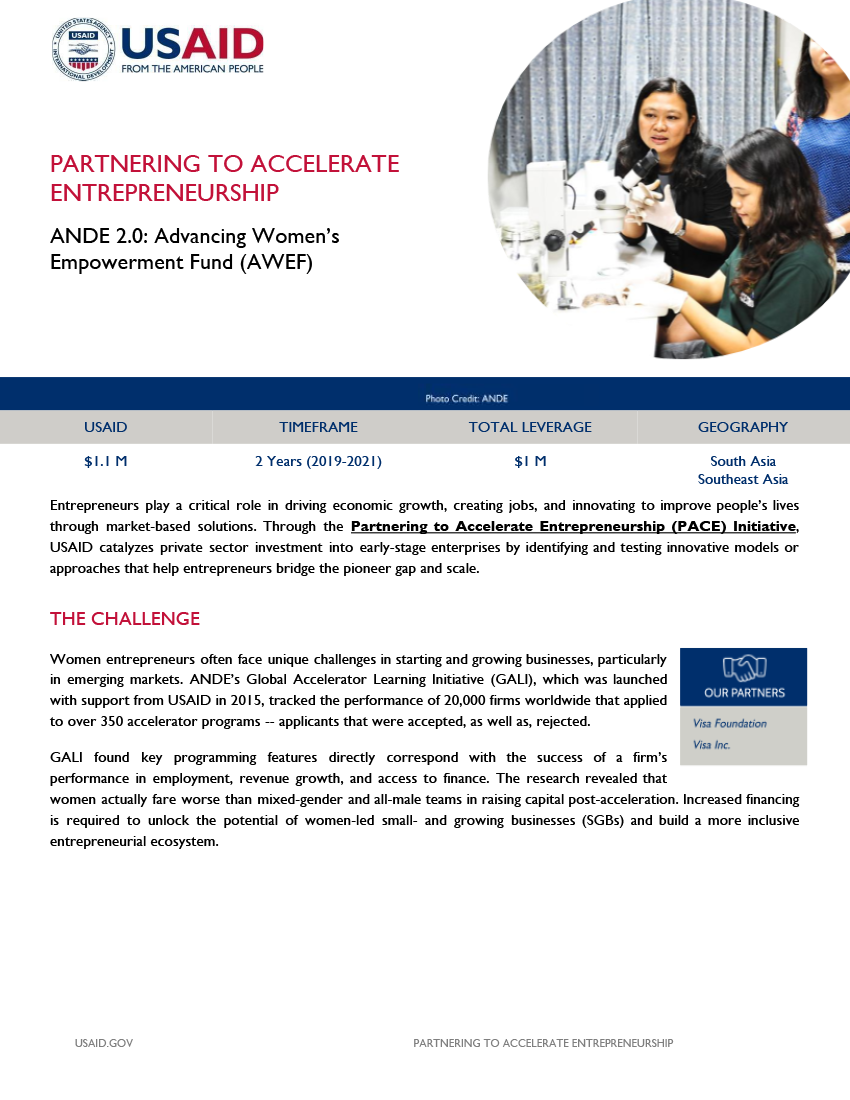- What We Do
- Agriculture and Food Security
- Democracy, Human Rights and Governance
- Economic Growth and Trade
- Education
- Environment and Global Climate Change
- Gender Equality and Women's Empowerment
- Global Health
- Humanitarian Assistance
- Transformation at USAID
- Water and Sanitation
- Working in Crises and Conflict
- U.S. Global Development Lab
Speeches Shim
Partnering to Accelerate Entrepreneurship (PACE)
Entrepreneurs play a critical role in driving economic growth, creating jobs, and innovating to improve people’s lives through market-based solutions. Through the Partnering to Accelerate Entrepreneurship (PACE) Initiative, USAID catalyzes private sector investment into early-stage enterprises by identifying and testing innovative models or approaches that help entrepreneurs bridge the pioneer gap and scale.
THE CHALLENGE
Women entrepreneurs often face unique challenges in starting and growing businesses, particularly in emerging markets. ANDE’s Global Accelerator Learning Initiative (GALI), which was launched with support from USAID in 2015, tracked the performance of 20,000 firms worldwide that applied to over 350 accelerator programs --applicants that were accepted, as well as, rejected.
GALI found key programming features directly correspond with the success of a firm’s performance in employment, revenue growth, and access to finance. The research revealed that women actually fare worse than mixed-gender and all-male teams in raising capital post-acceleration. Increased financing is required to unlock the potential of women-led small-and growing businesses (SGBs) and build a more inclusive entrepreneurial ecosystem.
| USAID | TIMEFRAME | LEVERAGED IN PRIVATE CAPITAL | GEOGRAPHY |
|---|---|---|---|
| $1.1 M | 2 Years (2019-2021) | $1 M | South Asia Southeast Asia |
THE PARTNERSHIP
Under PACE and the Women’s Global Development and Prosperity (W-GDP) Initiative, USAID partnered with ANDE, the Aspen Network of Development Entrepreneurs and the VISA Foundation, to pilot, test, or expand scalable solutions that tackle the financing gap for women-led SGBs in South and Southeast Asia.
The initiative’s first activity, the Advancing Women’s Empowerment Fund will distribute over $1 million in funding over two years to organizations in South and Southeast Asia and identify the best strategies to get capital into the hands of women entrepreneurs in these regions.
Illustrative activities include:
- More gender transformative responsive approaches to delivering acceleration services, including recruitment, selection, cohort and program design, or other elements seen as constraints to the success of women entrepreneurs;
- Supplemental services delivered independently or in coordination with traditional accelerator programs, including tailored consulting services, bespoke matchmaking, investment facilitation, mentorship, or other approaches to address deficits for women in traditional acceleration;
- Innovative approaches to tackle systemic constraints to bolster investment in women entrepreneurs.
EXPECTED RESULTS
The AWEF project seeks to build inclusive entrepreneurial ecosystems in emerging markets and work with partners dedicated to addressing gender bias and exclusion. It will strengthen intermediaries — incubators, accelerators, and investors — that build the capacity of women entrepreneurs and connect them with appropriate sources of capital so they can grow.. In addition, AWEF will advance the role of women as decision makers--as fund managers, board members, mentors, and employees..The partnership will also share lessons learned and insights with the broader SGB sector to help incubators, accelerators and others better support women entrepreneurs.
ANDE will fund between eight and 15 proposals with a total of $1.2 million.
FOR MORE INFORMATION
To learn more about the PACE Initiative, visit usaid.gov/pace or contact: pace@usaid.gov.
About the United States Agency for International Development
USAID is the world's premier international development agency and a catalytic actor driving development results. USAID's work advances U.S. national security and economic prosperity, demonstrates American generosity, and promotes a path to recipient self-reliance and resilience.


Comment
Make a general inquiry or suggest an improvement.